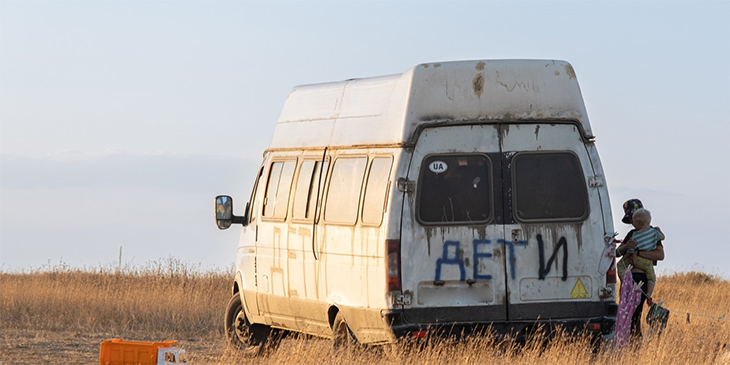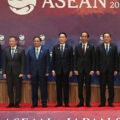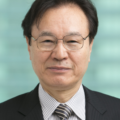Is Japan Prepared for “War Crimes”?

Minibus for the transport of refugee families bearing the inscription “children” to prevent shelling of the vehicle
Photo: Dina Damotseva / PIXTA
Akane Tomoko (Judge, International Criminal Court) and Philipp Osten (Professor, Keio University)
An Arrest Warrant for Putin
――Russia’s military actions in Ukraine are still continuing, with widespread killing of civilians and destruction of infrastructure. Judge Akane, you were one of the judges involved in the decision at the International Criminal Court (ICC) in The Hague, Netherlands to issue an arrest warrant for Russian President Vladimir Putin. Can you tell us about what is currently going on with the investigation?
Akane Tomoko: All of this is unfolding as we speak, with plausible risks for the victims’ safety and the investigations, and as a Judge, being an impartial actor, some things are difficult to discuss. What I can confirm is that, following a request by the ICC Prosecutor who was investigating the situation, the three Judges of Pre-Trial Chamber II, to which I belong, issued arrest warrants on 17 March [2023] after considering the reasons, evidence, and necessity for an arrest. The crime that is alleged to have been committed is the unlawful deportation and transfer of population (children) from occupied areas of Ukraine to the Russian Federation, which falls within the category of “war crimes.”
Philipp Osten: Arrest warrants have been issued for Mr. Vladimir Putin and Ms. Maria Alekseyevna Lvova-Belova, Commissioner for Children’s Rights in the Office of the President of the Russian Federation.
Some may wonder why the warrants don’t focus on the massacre of civilians in Bucha near Kyiv, Ukraine or other incidents that have shaken the world. I think this was largely due to evidentiary reasons. The prosecutor cannot easily request an arrest warrant without evidence of Mr. Putin’s direct involvement. Since Mr. Putin signed a presidential decree on the acquisition of Russian citizenship for children from the occupied territories, this perhaps could be seen as indicative of his personal criminal liability. Reports have also suggested that Russia is providing ‘patriotic re-education’ to the abducted children. Such forced transfers are extremely serious criminal offences, even if they don’t involve immediate casualties. This is because they greatly impact the demographic composition of the affected country as well as its identity. Nazi Germany similarly implemented systematic transfers of children from Poland and other occupied territories, providing them with ‘Aryan education’ in specialized facilities. Thus, such acts can be regarded as a ‘common method’ in the context of an inhumane war.
Depending on how the investigation progresses, it is possible that other charges pertaining to different categories of war crimes or even “crimes against humanity” are added.
Akane: The ICC only has subject-matter jurisdiction over the most serious crimes of concern to the international community as a whole. That means the following four categories of crime, which are known as the “core crimes”: (1) the crime of genocide, (2) crimes against humanity, (3) war crimes and (4) the crime of aggression.
Concurrently with the ICC, Ukraine is conducting domestic investigations and trials pursuant to Ukrainian law. The ICC does not have supremacy over national courts nor is it a substitute for them. In principle, core crimes should also and primarily be adjudicated by states. However, in the absence of the ability or willingness to do so the ICC can complement domestic jurisdictions and adjudicate cases. This is known as the “principle of complementarity.”
Osten: This principle at a first glance maybe makes the ICC system look very weak. However, if an act that would normally constitute a crime against humanity is treated as an ordinary crime, such as mere murder, under domestic law, the ICC may deem that criminal prosecution at the national level is insufficient and move to initiate prosecution itself.
Akane: In fact, in relation to the Philippines, ICC prosecutors are investigating suspicions that numerous drug offenders were murdered without formal judicial process as part of the former Duterte administration’s “war on drugs.”
The ICC is a permanent court which has been established in 2002 on the basis of a treaty known as the Rome Statute by UN member States who concurred with its object and purpose. As such, it is not an UN organ. This is what sets the ICC apart from the International Court of Justice (ICJ), the principle judicial organ of the UN, which resolves territorial disputes and other disputes amongst States. The “International Criminal Tribunal for the former Yugoslavia” and the “International Criminal Tribunal for Rwanda,” which tried war crimes and other cases pertaining to the ethnic conflicts in the former Yugoslavia and the Rwandan genocide, were likewise UN courts, in the sense that they were established by resolutions of the UN Security Council.
Osten: The ICC can be traced back to the “Nuremberg trials” and the “International Military Tribunal for the Far East (Tokyo Trial),” where the victors tried war criminals from Germany and Japan, respectively, after World War II. These and the more recent UN international criminal tribunals mentioned by Judge Akane were temporary courts established ex post facto (i.e., in the aftermath of wars or conflicts). For this reason, there was criticism pertaining to the principle of legality (“ex post fact law,” or retroactive law). Yet this problem has been resolved since the ICC only has jurisdiction over cases that have occurred after the Rome Statute came into force in July 2002.
The Likelihood of Arresting Putin
―― Is there any possibility of the arrest warrant for Mr. Putin being executed?
Akane: The purpose of an arrest warrant is to secure the arrest of a person and advance to the next step in the judicial process. Judges would not issue arrest warrants on the assumption that there are no chances of them being executed. I do not think it is appropriate for me as a Judge, to speculate about the political significance of the issuance of arrest warrants. Nonetheless, unlike in Japan, these arrest warrants do not expire. Unless they are withdrawn, for example, due to the death of the suspect, the warrants will remain valid.
Osten: I think that issuing the arrest warrant was an exceedingly important step in itself. The ICC issued an arrest warrant for the incumbent head of state of a permanent member of the United Nations Security Council. This demonstrates that the court will not hesitate to prosecute such persons, regardless of their rank and power, and this is the first time this happened in the history of international criminal tribunals.
The ICC does not have a law enforcement organ, like a police force. This means that it isn’t possible for the ICC to detain the suspect on its own, which is why the court has been described as a “giant without limbs.” In order to execute an arrest warrant, the ICC must request the cooperation of states parties to arrest and surrender (extradite) the person if they enter any of those countries.
Akane: States Parties to the ICC have an obligation under the Rome Statute to cooperate with the ICC and to comply with its request to enforce a warrant under their national law, if a person subject to a warrant enters its territory. This also applies to Japan. The “Act on Cooperation with the International Criminal Court,” that was enacted when Japan became a State Party in 2007, provides the procedure through which Japan carries out such obligations.
Osten: Whether or not Mr. Putin will be taken into custody is difficult to predict at this stage. Nevertheless, the fact that 123 states parties now have a legal obligation to cooperate is quite impactful. A side effect of the arrest warrant can be seen in the fact that it is apparently already restricting Mr. Putin’s freedom of movement. Mr. Putin participated online at the BRICS Summit in August 2023, after South Africa, the host country and an ICC state party, requested him not to attend in person.
Legally speaking, member states have a legal obligation to cooperate and to apprehend suspects. At the same time, an incumbent head of state also enjoys what is called immunity. This means that two conflicting demands arise at the same time. Under customary international law, heads of state, heads of government, and foreign ministers are entitled to “personal immunity” (or immunity ratione personae), which implies that they are not subject to the exercise of foreign criminal jurisdiction while in office. Even so, since this immunity only applies as long as they are in office, prosecution is possible after they leave office.
―― Have there been similar cases in the past?
Osten: The case of Former President Omar al-Bashir of Sudan, Africa has been a point of contention. In 2009, the ICC issued an arrest warrant for Mr. Bashir on suspicion of his involvement in the Darfur region massacres. Yet when Mr. Bashir visited Jordan during his presidency, he was not arrested and then allowed to leave the country, even though Jordan was a state party to the ICC. Court proceedings at the ICC were held to determine whether this constituted a violation of Jordan’s legal obligation to cooperate with the ICC, basically ruling that personal immunity is not applicable in case of prosecution for core crimes by an international tribunal such as the ICC, meaning that Jordan had been under an obligation to arrest him.
Yet, in reality, the question remains whether Mr. Putin can be taken into custody not just while in office but also after he leaves it. Since the Constitution of Russia has provisions pertaining to the principle of non-extradition of its own nationals, we can’t expect an extradition to the ICC as long as he remains within Russia. However, it is important for the international community to make full use of economic sanctions and diplomatic pressure to ensure that there is no escape from justice, including in his home country.
A “Warrant” against Judge Akane
――In July, Russian authorities issued warrants against three ICC judges, including Judge Akane, on the basis of violating Russia’s criminal code.
Akane: I will refrain from discussing personal aspects since this concerns the ICC’s overall mandate, but the warrants against the Judges should not have the effect of hampering the Court’s judicial activities. The Court has conducted judicial proceedings in accordance with the Rome Statute and will continue to do so. I would also like to add that the President of the Assembly of States Parties as well as Japan and other countries concerned have issued statements condemning and expressing their deep concern over the events.
Osten: Issuing warrants for the judges in charge of an ongoing case is clearly a retaliatory measure. Russia has not directly refuted these allegations, merely saying that it does not recognize the jurisdiction of the ICC. In a way, these events could perhaps be seen as an indication of how helpless the Russian side feels.
This is the first time in the history of international criminal tribunals that a warrant has been issued for a judge in charge of a case by the home country of the suspect. The international community should stand together and send a clear message that any retaliatory actions against members of the ICC or any other judicial body are unacceptable. Unlike the UN Security Council, of which Russia is a permanent member, it would be conceivable for the UN General Assembly to adopt such a condemnatory resolution.
“War Crimes” Cannot Be Tried in Japan
―― What role can Japan play in international criminal justice? Is Japan’s current domestic law sufficient to deal with war crimes?
Akane: Japanese law, as it stands, does not specifically criminalise the crime of genocide, crimes against humanity, and major war crimes. This means that these international core crimes would need to be dealt with as ordinary crimes under Japanese criminal law, and the position of Japan has been that this suffices.
Osten: The Japanese government’s view that domestic criminal law provisions, such as for murder and injury, can sufficiently deal with crimes against humanity and genocide, etc., has both theoretical and practical deficiencies. For example, an act of systematic killing against civilians with the backing of state power may constitute a crime against humanity. However, if this is treated as “murder” under Japan’s criminal law, constitutive and contextual elements of such crime against humanity which form the basis of its specific legal nature, such as the systematic character of the act, committed pursuant to a state’s policy, cannot be reflected appropriately. There is thus a risk of not being able to properly assess the legal nature and gravity of such a core crime under international law.
Akane: There are certain types of crimes that cannot be punished by Japan’s current criminal law, and even if they could, it is not hard to imagine that there would, in practice, be difficulties in investigating and prosecuting such core crimes. In the case of an act of killing committed in the context of a war crime, one would need to consider the specific context where such acts were committed as part of a broader armed conflict, whereas the same act would be reduced to individual murder in the context of ordinary crimes under Japanese criminal law. The evidence to be collected will be different depending on the ‘label’ (categorization) of the crime.
Until recently, I had simply accepted the official explanation that core crimes can be properly punished without the need to create new provisions criminalising them as such. But Russia’s military actions in Ukraine lead me to reconsider. I have reflected in particular about whether a similar situation might happen in a geographic region closer to Japan, and if so how Japan would respond to it. The Japanese government has moved towards increasing the defence budget, but one should also reflect on whether the legal system is sufficiently equipped to address any situation that may arise.
In particular, it is very likely that the current legal framework would not allow for the investigation or prosecution of crimes that occurred outside of Japan involving non-Japanese perpetrators and victims. In such a case, even if the suspect were to enter Japan, it would be difficult to prosecute them, and more so to participate in investigations overseas.
Osten: I fully agree that this constitutes a major deficiency in Japan’s current criminal law system. Japan does not have penal law provisions specific to the most serious crimes under international law, and foreign perpetrators who have committed such crimes abroad against foreigners cannot be prosecuted and punished even if they enter Japan. Thus, Japan risks becoming a “safe haven” for such criminals or a “loophole” in the international justice network. This should be recognized and addressed promptly as a legislative policy issue of paramount importance.
Japan was one of the first Asian states parties to refer the situation in Ukraine to the ICC. So far, three Japanese judges have served at the ICC, including Judge Akane, and Japan has contributed in various other ways as well, such as making the largest financial contributions to the court. However, beyond this, further substantive cooperation in the sense of actively participating in and contributing to the global prosecution network envisioned by the ICC system in its fight against impunity is not possible given the current state of domestic law.
Akane: In the event of an emergency situation in a neighbouring country, which could possibly have an impact on Japan’s position within the international community, what would happen if Japan turns out to be unable to act appropriately due to insufficient domestic legislation, and thus can do no more than provide humanitarian and other logistical support? Would that be conducive to Japan’s security?
―― How are other countries addressing these issues?
Osten: In Ukraine, core crimes are continuously being committed in a widespread and perhaps even systematic manner. The situation is so extensive and serious that it cannot be dealt with by Ukraine or the ICC alone. Besides Ukraine, where national criminal proceedings for war crimes have already commenced, so-called “third states” without any direct connection to these crimes, such as France, Germany, Poland, and Canada, have begun to cooperate and investigate war crimes based on their own domestic law. These countries have incorporated most of the core crimes into their domestic legal order. Besides establishing such specific penal provisions in domestic criminal law, these countries have also enacted legislation providing for extraterritorial jurisdiction for core crimes committed by foreign perpetrators abroad, enabling them to exercise jurisdiction, even without an involvement of own nationals. Furthermore, based on this legal framework, such countries can also cooperate with the ICC in gathering evidence for such crimes.
Akane: European countries are launching investigations to the extent that their legal systems allow. Japan has neither appropriate laws nor jurisdiction, so there can be no momentum to join such collaborative actions. I am worried that European countries might see Japan as being very inward-looking.
―― What should Japan do?
Akane: As someone facing the situation in Ukraine and as a Japanese national, I think it is important for Japan to put a realistic system in place that would allow it to assist in punishing the most serious crimes of international concern. I hope for Japan to reform its legal system, starting by resolving the issues that we are already aware of, and for example to at least join the “Genocide Convention” (a treaty that obliges member states to prevent and punish genocide, adopted by the UN General Assembly in 1948).
Osten: Possible Japanese accession to the Genocide Convention has already been discussed several times in the National Diet since the 1950s, but my impression is that, even though nuances in the official explanations have changed slightly over the decades, the government’s responses have consistently taken the basic stance that “careful consideration” is required. In addition, supposedly insufficient “legislative facts” (i.e., the practical unnecessity of legislative measures) are sometimes also invoked as a reason for non-accession to this treaty, suggesting that there are no issues that need to be resolved immediately that would justify manpower of the ministries in charge being spent on such legislative work.
Akane: I think it is unlikely that war crimes and crimes against humanity would be committed within Japan in the immediate future. However, following on from the situation in Ukraine, I believe that circumstances have changed such that we cannot rule out the possibility of such crimes occurring in the vicinity of Japan.
I believe that the need to demonstrate Japan’s willingness to cooperate with countries in the Asia-Pacific region to maintain regional security and to carry out such responsibilities constitute sufficient ‘legislative facts’ compelling Japan to enact legislation. My concern is that the government’s previous explanations might no longer be convincing.
Osten: The challenge that the Ukraine war has posed to Japan is, in essence, the inadequacy of its domestic criminal law system to prosecute and punish international core crimes. I believe that enacting legislation and participating more actively in the international criminal justice system is what the world expects Japan to do.
This may sound abstract, but the underlying question is whether Japan is willing to incorporate the fundamental international legal notions, which are embodied in war crimes, crimes against humanity, and the crime of genocide, into its domestic legal order and to thus establish a shared value system against impunity. One could say that the Ukraine war has facilitated a major turning point for re-considering Japan’s position in the field of international criminal justice.
How Japan Can Play an Active Role
―― What would it take for Japanese citizens to exercise their abilities on the stage of international criminal justice?
Akane: Ever since Japan joined the ICC in 2007, it has made significant contributions to its administration, as mentioned by Professor Osten. However, while the ICC has around 900 employees, the number of Japanese staff is extremely small, ranging from single digits to about a dozen. The high number of Europeans in important posts leads to the ICC being characterised by some as a “European court.” To begin with, it is important to increase the number of Japanese employees in the various international institutions.
I worked as a public prosecutor in Japan before becoming an ICC judge, and there were very few opportunities for me to learn about war crimes, crimes against humanity, and international criminal justice. Therefore, I believe that it is necessary to make an effort to increase human resources with good knowledge of these topics. Public prosecutors, police officers, and judges in Japan have a very strong sense of mission, so if domestic law specifically criminalising core crimes were to be enacted, I am confident that they will pay attention to such provisions and think about how to for example prove that something occurring is a war crime. I think that would give more opportunities for such professionals to learn, study abroad, and be involved in practical work at the ICC, for example, in anticipation of such situations.
I would like young people who aspire to work in the field of international criminal justice to believe in themselves and move forward, never forgetting to try new things. In the information age, it may be necessary to have not only information but also role models, but we still do not have that in concrete form. But that is also never going to change if we don’t make up our minds and dive in head-first. If there is something you want to do, even if all the conditions are not met, I want you to have the courage to move forward without giving up from the outset.
Osten: We also need to improve professional education at the universities. There are only very few universities in Japan that offer specialized courses in international criminal law. There actually aren’t so many in Germany or the United States either, but this subject is assigned a different position and weight there. In Germany, for example, international criminal law is generally treated as an extension or a special area of domestic criminal law. By contrast, since there is no corresponding domestic law in Japan, international criminal law is often regarded as existing only ‘outside’ the domestic law system and discussed only as a branch of international law.
――English and French are the “official languages” of the ICC.
Akane: Language studies are an endless struggle actually. It is true for English proficiency, let alone French… It depends on the case, but for example, in the case in the situation of Mali that I work on, more than 13,000 pieces of evidence – comprising documents, videos, and photographs – were submitted and more than 70 witnesses were examined in court. Yet, for the ICC, this is a relatively small case. Sometimes I would use an automatic translation tool or have staff members translate materials into English.
When I was in my thirties, I took a leave of absence from my job as a public prosecutor to study abroad in the United States for two years, and that was my first time living abroad. If possible, you should study abroad in an English- or French-speaking country for at least two years to gain knowledge of the language there. Rather than going to a language school, I think it is better to have practical experiences by, for example, attending training at a German court or working on a criminal case at a British law firm.
Osten: The overwhelming majority of ICC staff are quasi-native English speakers, and I’ve heard rumours of cases where people get elevated to key positions thanks to their language skills, and not only their legal skills, etc.. Japanese public prosecutors, judges, police officers, and lawyers are among the most well-trained practitioners in the world. I hope such talented Japanese legal professionals can overcome the language barrier and play a more active role in the field of international criminal justice.
Akane: One way to do that would be to make English language part of the bar exam. I have heard that that is already the case in South Korea and other countries. I think we are living in an era where everyone working in the judicial field must have a certain level of English proficiency.
At times it is hard to get along with people from different countries who often are more outspoken and direct than what we are used to in Japan. Every day is a continuous struggle for survival, and the only way to digest the unpleasant things is to erase them with the foam of that one beer that you enjoy at night. (laughs)
How to Respond to Criticism of the ICC
――The ICC has been criticized for not having major countries such as the United States, China, India, and Russia as members, resulting in a track record with an Africa bias.
Akane: In the absence of a ‘world government’, there is no system for freely navigating the world to conduct necessary investigations, arrest suspects, and bring them to criminal justice. First of all, it is necessary to establish a system that accords with the rule of law within each country and make efforts to eliminate impunity. Building on that, criminals should be brought to justice using the framework of international cooperation. In this sense, it is a major step forward that the ICC was established by the consensus of many countries and that it has 123 member states.
Of course, it is not surprising that the ICC is imperfect at this stage. The reason that the trial proceedings so far have been limited to Africa is because those countries tend to refer the situations in their respective territories to the ICC for investigations and also because securing cooperation might be difficult in other regions.
Osten: Of the four core crimes, criticism pertaining to the crime of aggression has had to do with the ICC’s limited and inadequate jurisdictional regime regarding this core crime. Russia’s invasion of Ukraine seems like a textbook case of aggression. However, as it stands, it does not meet the conditions for the ICC’s jurisdiction to be exercised, so it is not possible to hold Mr. Putin and others accountable for crimes of aggression.
This is also a result brought about by the ICC’s states parties themselves. The definition of the crime of aggression was added to the ICC’s scope of crimes in 2010. At the time, however, most states parties acted extremely cautiously and granted the ICC only very limited jurisdiction.
The hurdles for revising the Rome Statute are high, so it is unlikely that it will be improved in the near future, as individual countries have different agendas. As such, it is important to increase the number of ICC states parties while also increasing the number of countries that have ratified the provisions on the crime of aggression, which were formulated later. Japan has not yet ratified these provisions, and this point will likely also become part of the discussions about reviewing domestic law.
Akane: The ICC is a new institution and is still in the process of building a solid track record. The question is how to get more and more Asian countries to join so that it can grow into “a criminal court of the world” in the literal sense of the word. To that end, I think the most important thing is for the ICC’s criminal justice processes and trial outcomes to be recognized and trusted around the world. This means settling the cases we have before us one by one and building a solid track record.
In order to contribute to the punishment and deterrence of the most serious crimes of concern to the international community as a whole, I would like to see Japan develop the necessary legislation and promote human resource training. Japan’s criminal justice system has developed over a long period of time, so I am confident that there are many Japanese with the potential to play an active role in international criminal justice and to contribute to it, including police officers, prosecutors, judges, lawyers, and other judicial personnel. I believe that creating a framework for international cooperation in the Asia-Pacific region and Japan demonstrating leadership will help develop international criminal justice further.
Moderated by Nakanishi Kenji (Yomiuri Shimbun Berlin Bureau)
Translated from “Nihon wa ‘Senso Hanzai’ eno sonae wa aruka (Is Japan Prepared for ‘War Crimes’?),” Chuokoron, October 2023, pp. 94–103 (Courtesy of Chuo Koron Shinsha) [November 2023]
Keywords
- Akane Tomoko
- Judge
- International Criminal Court
- Philipp Osten
- Keio University
- Vladimir Putin
- arrest warrant
- war crimes
- crimes against humanity
- crime of genocide
- crime of aggression
- Russia
- Ukraine
- personal immunity
- immunity ratione personae
- international criminal justice
- Japan
- Genocide Convention
- “legislative facts”
- legislation






